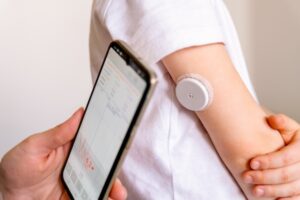 There are tons of devices out there to look at your blood sugar level. CGM is a continuous glucose monitor. In our American diet, many people progress to Type 2 diabetes, which tends to happen more with genetics, obesity, and increased age. We assess this at Biohackr Health by checking your fasting glucose and HbA1C levels (this looks at average blood glucose over the prior 3 months) as part of our insulin resistance panel.
There are tons of devices out there to look at your blood sugar level. CGM is a continuous glucose monitor. In our American diet, many people progress to Type 2 diabetes, which tends to happen more with genetics, obesity, and increased age. We assess this at Biohackr Health by checking your fasting glucose and HbA1C levels (this looks at average blood glucose over the prior 3 months) as part of our insulin resistance panel.
Why should you care?
Diabetes is the cornerstone so much disease: heart disease, blood pressure, atherosclerosis, healing issues, and cancer risk.
As we progress in medicine with wearables and the new deluge of information about YOU, we realize people are different in how they respond to simple things. What happens when you eat a bowl of ice cream? Is it the same as your spouse? What happens if you eat a bagel? half a bagel? Is it different if you add peanut butter? What happens now if you walk for 5 minutes after your meal?
Continuous glucose monitors are great to see how you react to eating. What is the rate you eat? What is the composition of what you eat? Carbohydrates? Proteins? You can start to analyze your diet in how your body reacts, which really helps you dial in how and what you eat. Monitors give you real time data on what happens to your body when you eat. It shows:
- Average blood glucose. The lower this number, the lower your risk for “all cause mortality.”
- What is your range? How variable is it?
- How big are your spikes?
Knowing this data will help you adjust your eating to improve your health. Simple substitutions (eat this cereal, not that one), changing amounts (eating half a bagel is okay, but a whole bagel overwhelms your body), changing the ratio of your foods (so you eat bread with a protein on it, not plain), changing activity level and timing (taking a short walk of 2-5 minutes has been shown to slow glucose rise), intermittent fasting, and metformin can help. All this will lead to better health.
So is it worth it? Start with checking where you are at now. Some people have little issue with their blood sugar- their body is already doing a good job. For those with a HbA1C over 5.0, it is likely good for you to evaluate. According to the NIH above 5.7 – 6.4 is prediabetes. Above 6.5 is diabetes.